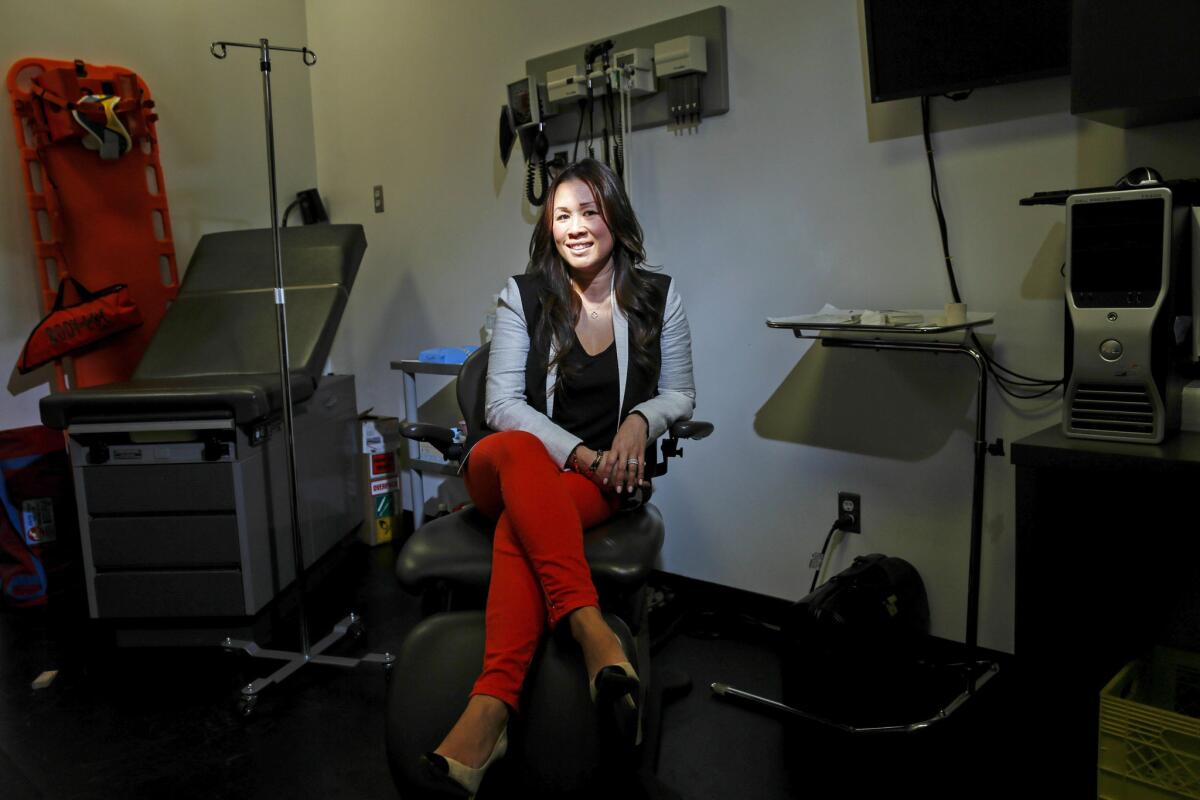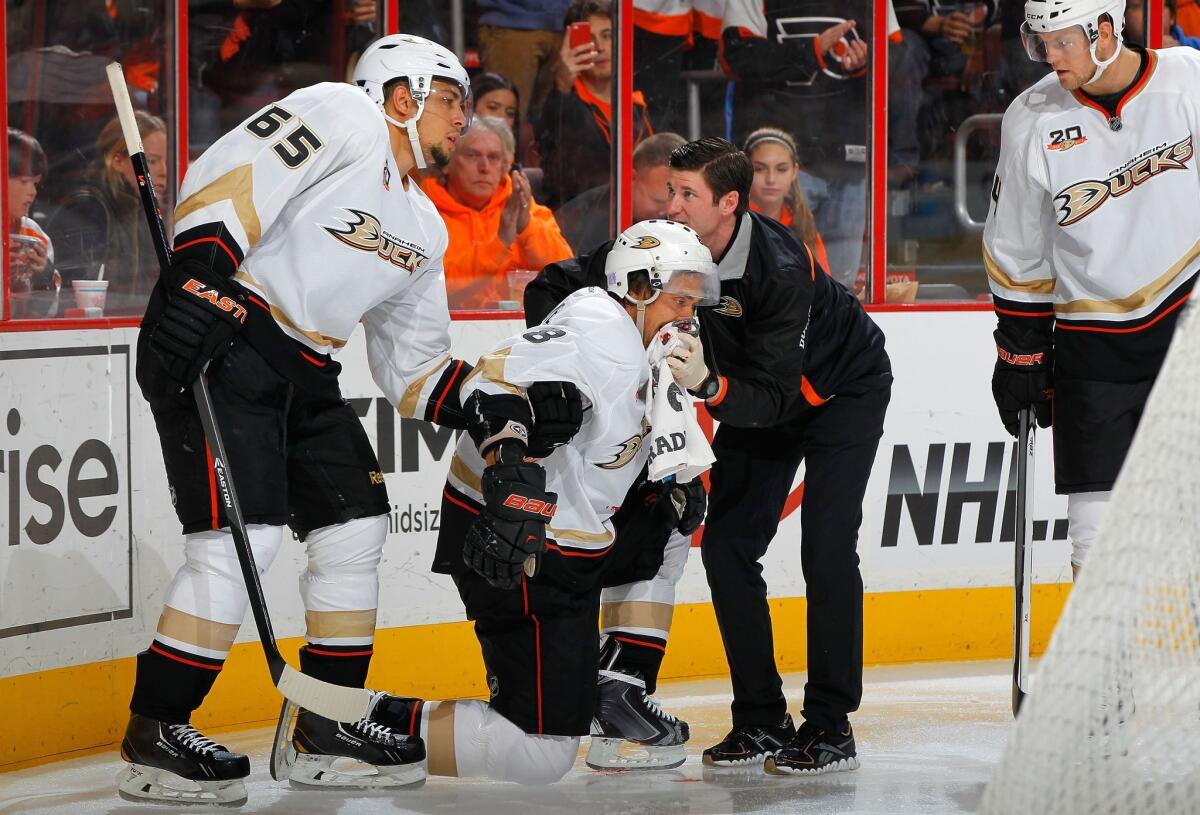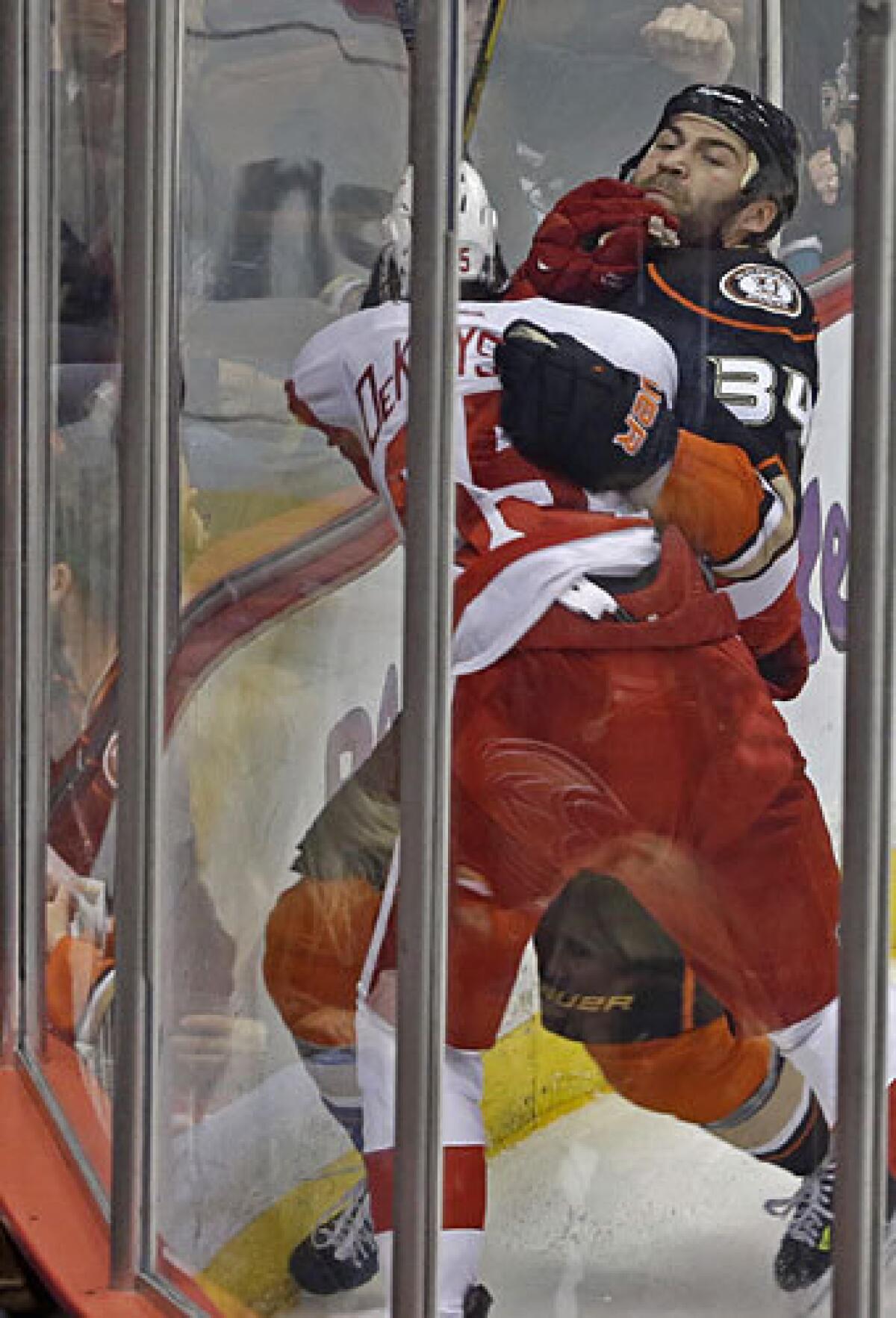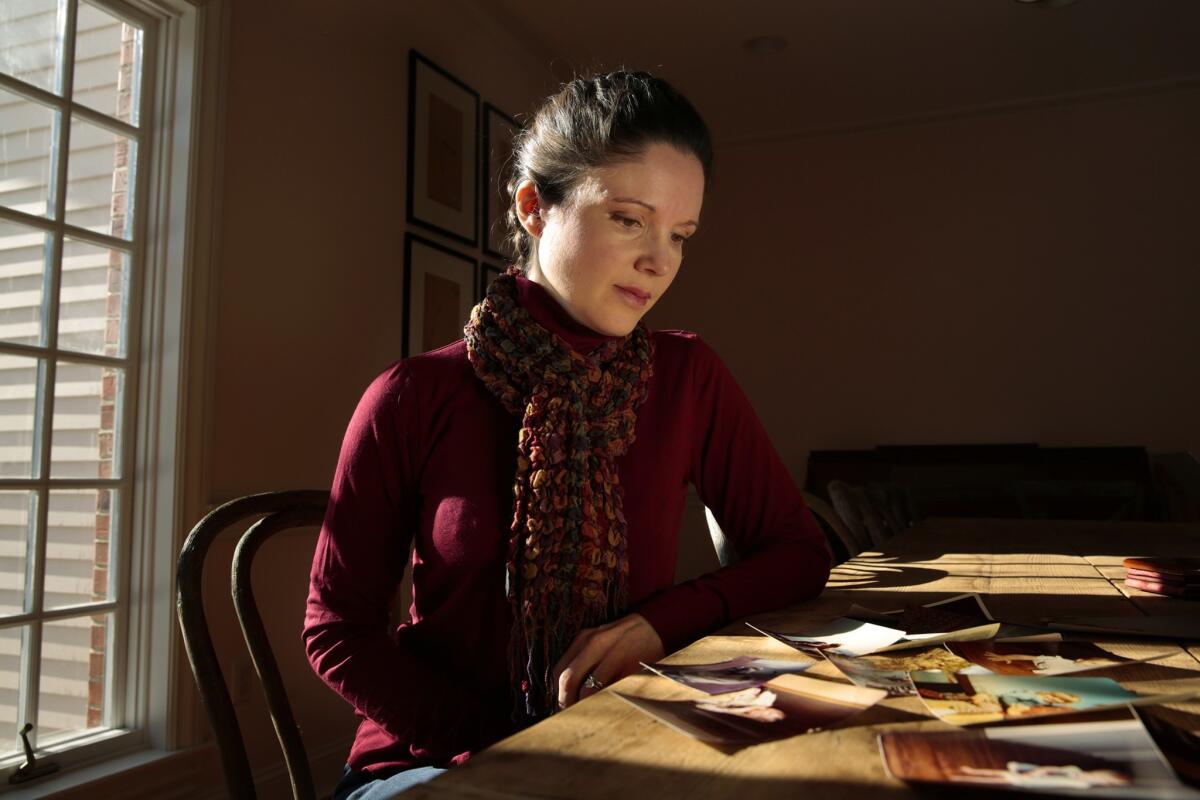Ducks’ dentist does more than fill in the gaps
Dr. Bao-Thy Grant is responsible for any injuries from the neck up in hockey games at Anaheim. A mother figure, she looks out for the players, urges them to wear mouth guards and winces at every hit.
- Share via

The doctor holds up a hand and says, "Wait." She turns away to rummage through a drawer, explaining: "I want to show you something."
It takes a moment to push aside the syringes and packets of gauze before she locates a small, white shard and cups it in her palm.
"Sometimes I save the broken teeth," she says.
Forty or so nights each winter, Dr. Bao-Thy Grant practices a different sort of medicine, setting up shop in a cramped room beneath the stands at Honda Center in Anaheim. She is the team oral surgeon for the Ducks.
Her patients arrive sweaty and out of breath, wearing helmets and skates. Maybe a flying puck has smashed them in the mouth. Maybe they need stitches for a high stick that has sliced open their cheek.
"We get some complex, deep lacerations that require deep sutures," she says. "You don't see that with an elderly woman who tripped taking out the trash."
This self-described "short Asian chick who knows nothing about hockey" administers to professional athletes who have unusually high thresholds for pain, yet she speaks to them in soothing tones as she cleans and numbs their wounds.
In the rough-and-tumble world of a violent sport, Grant sees herself as a mother figure, bugging the players to wear their mouth guards and wincing at every big hit on the ice. It makes her wonder: Why must they be so hard on each other?
"She certainly looks over us," defenseman Cam Fowler says. "You can tell that she doesn't like seeing us get injured."

With the Ducks facing the Edmonton Oilers on a Sunday evening, Grant arrives an hour early. The arena's medical office, adjoining the locker room, is nothing like her private practice in Orange.
The room is narrow and brightly lighted with supply cabinets along the back wall and, closer to the door, a dentist's chair. The black rubber floor has seen its share of sweat and blood over the years.
Putting on gloves, she begins her pregame routine, using disinfectant to wipe the counters, the lights, the phone — anything that might carry germs.
"I'm always sanitizing," she says. "I like a controlled setting."
Ryan Getzlaf, the team's star center, offers another explanation: "I think that's how she calms her nerves."

Teemu Selanne of the Anaheim Ducks is tended to by trainer Joe Huff and teammate Emerson Etem after an injury in a game against the Philadelphia Flyers on Oct. 29 in Philadelphia. (Jim McIsaac / Getty Images)
Grant specializes in oral and maxillofacial surgery, so she is responsible for any injuries from the neck up. With more players wearing mouth guards these days, shattered teeth are less common, but there are still plenty of cuts and the occasional facial fracture.
Teemu Selanne, the veteran winger, took a high stick to the mouth in late October. Six weeks later, she still checks on the wound, stopping by the locker room as the players stretch.
"She wants to make sure that we're going to look pretty again," Selanne says.
With the game drawing near, there is just enough time to eat dinner in an arena lounge, drink a cup of hot green tea and do one more thing.
"I always say a prayer," Grant says. "I pray that no one gets hurt."

I always say a prayer. I pray that no one gets hurt."— Dr. Bao-Thy Grant, Anaheim Ducks oral surgeon
The other team doctors — two physicians — sit in the stands near the bench. Grant prefers to wait below, watching a television monitor on the wall so she can prepare for the moment a player goes down.
With muffled echoes of cheering outside her door, the 37-year-old finds a pair of scissors to begin working on Saku Koivu's custom mouth guard — like other players, the center wants a slim fit.
Trimming the edge makes the guard less effective, but if a player is more likely to wear it, she says, "that's better than nothing."
Grant grew up with a peculiar interest in the human mouth. As a teenager at North High in Torrance, she envied classmates who had braces and would bend paper clips into the shape of retainers.
"Why I was fascinated, I can't tell you," she says. "Everyone I looked at, I looked at their teeth."
After attending dental school at USC, Grant completed a four-year residency in the Bronx and married another dentist. In 2008, they settled in Orange County, where she began working with Dr. Jeffrey Pulver.
It was Pulver who introduced her to hockey. He had been the Ducks' oral surgeon, a fixture around the locker room since the team joined the NHL in 1993. Just before he died from cancer in 2010, he asked her to take over.
Though daunted by the unfamiliar territory, she agreed as a tribute to him.
Much of the game still eludes her after more than three seasons on the job. Technical rules such as icing are especially confusing, she says as players streak back and forth across the television screen.

Anaheim Ducks center Daniel Winnik (34) and Detroit Red Wings defenseman Danny DeKeyser (65) tangle in January at the Honda Center. (Reed Saxon / Associated Press)
But when the cheering shifts to a distinctive "oooh," Grant knows enough to stop trimming and glance over her shoulder at the monitor.
That sound usually accompanies a big hit. She says: "I still get nervous watching games."

Earlier this season, against the Phoenix Coyotes, center Daniel Winnik skated in front of the net for a chance to score. Phoenix defensemen Keith Yandle whipped around and caught Winnik with a high stick.
"It was the corner of my eye," the Ducks forward says.
When he walked into her room with blood streaming down his face, Grant's first job was to calm him down because she knew the adrenaline was running high.
"Take a deep breath," she said. "Do you want some water?"
The blow lacerated part of Winnik's eyelid, making the wound a bit tricky. Washing away the blood and sweat, Grant injected a local anesthetic while Winnik kept an eye on a clock ticking down the game time in glowing red numbers.
"You always want to get back as quickly as possible," he says.
Players aren't the only ones who grow antsy. NHL doctors treat both benches, and if the other team has someone in Grant's chair, opposing coaches frequently check in by walkie-talkie: How's it going? Are we done? What's the status?
In Winnik's case, it took extra time to examine the eyeball for damage — there was none — and delicately suture the lid. He needed ice to reduce swelling before returning to play in the second period.
"She's real calm and comforting," he says. "She tells you everything's going to be OK."
Her composure was partly an act. After he left, she felt anxious.
"I just sat and watched the television, kept my eye on him," she says.

Midway through the more recent game against Edmonton, the Ducks' trainer slip-slides across the ice to check on Jonas Hiller, lifting up the goalie's mask to peer underneath. Grant wonders aloud: "Did he get hit with a stick? Was it a puck?"
Hiller is fine and the crowd applauds as play resumes. Awhile later, center Nick Bonino is slammed into the boards, but it is another false alarm.

The Ducks' Cam Fowler falls as he goes after the puck in a November game against the Tampa Bay Lightning in Anaheim. He says of the team's dentist: "You can tell that she doesn't like seeing us get injured." (Jae C. Hong / Associated Press)
"What's the score?" Grant asks.
Goals and assists mean little to her. When the television shows highlights of players bashing into each other, drawing cheers from the crowd, she looks away. The Ducks who wear their mouth guards and clear plastic face shields are her favorites.
Grant seems more excited about Selanne's use of protective gear than the goal he scores against the Oilers late in the second period.
That high stick in October knocked out a bridge, requiring 40 stitches. It happened in Philadelphia and, when he flew home to see Grant, she realized things could have been much worse.
No permanent teeth were damaged. The bridge, which spans four front teeth, was struck so hard that it embedded in his mouth guard.
"I just cemented it back in place," she says. "He's my hero."
The rest of the Edmonton game passes without incident. Grant is happy to spend a quiet night in her office, chatting with an X-ray technician who has a table in an even smaller room next door.
As the final seconds tick down on a 3-2 win for the Ducks, she bags the instruments on her surgical tray. They will be sanitized at her office the next day. One of the team physicians, Orr Limpisvasti, comes by and asks Grant to help him suture a minor leg cut in the locker room.
"It's hard for people to understand my anxiety," she says. "Most of these guys are so young — they're texting their moms while I'm treating them, saying 'I'm OK.' "
If she had her way, hockey would be limited to shootouts, which the NHL uses to break tie scores. An offensive player goes one on one against a goalie.
"I like that," she says.
No one gets hit. No one gets hurt.
Follow David Wharton (@LATimesWharton) on Twitter
Go beyond the scoreboard
Get the latest on L.A.'s teams in the daily Sports Report newsletter.
You may occasionally receive promotional content from the Los Angeles Times.










